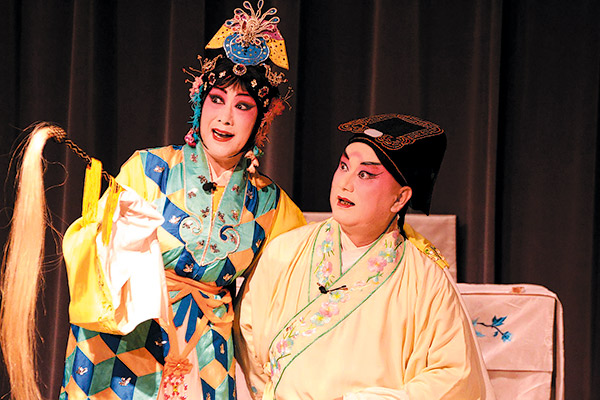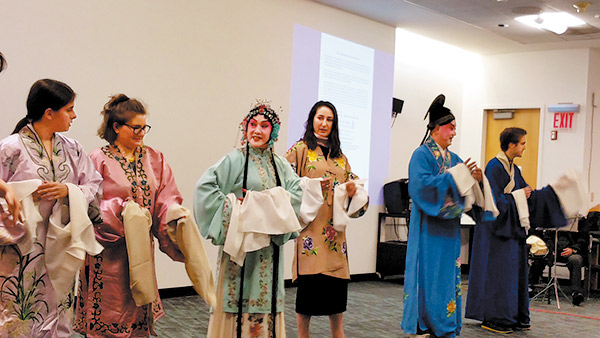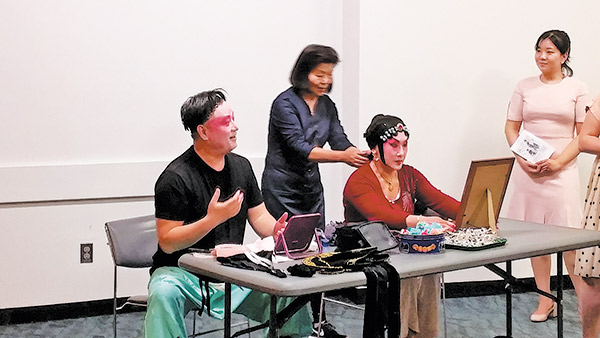Kunqu Opera takes a bite of Big Apple
From:China DailyAuthor: 2023-11-20 14:45

Kunqu performers of the Kunqu Society of New York in costumes and makeup at a City Hall event in June 2019. [Photo/KUNQU SOCIETY OF NEW YORK]
Traditional art form maintained by dedicated practitioners begins to attract greater interest, reports Mingmei Li in New York.
Aglance, a facial expression, a posture or a gesture, a spoken word, a tone accompanied by the melody of a flute and the resounding tap of a gong and drums, these are the fundamental elements of Kunqu Opera.
However, the direction of the gaze, the depth of the emotion expressed, the precise placement of hands and feet, the transition from stillness to movement, the repetition of lines dozens upon dozens of times during practice, the variation in tone and inflection, and the different characters, all meld with musical instruments of different frequencies. Add to this the rhythm and intensity of percussion and all these intricacies are repeatedly scrutinized and refined by Kunqu performers before they put on their costumes and makeup.
In New York, longtime Kunqu artists and students are working together to pass down the ancient traditional form from generation to generation, and Kunqu societies have been active in the city for over 30 years. And recently, these Kunqu Opera practitioners young and old staged a performance at the Big Apple to commemorate the 35th anniversary of the Kunqu Society of New York, a nonprofit culture and arts organization.
"My home is actually the birthplace of Kunqu, but I only began to systematically study it in the United States," says Daisy Huang, who comes from Jiangsu province, and has been studying Kunqu Opera for around 20 years.
"The show by Kunqu professionals and students maintains the same level of quality as an official production. The dedication to teaching is exceptional, and we faithfully preserved the essence of Kunqu," she adds.
For the last 30-odd years, the Kunqu Society of New York has been nurturing this cultural legacy, to preserve its splendor, and the Society has organized 300 public programs, including around 40 Kunqu performances.
"When Mei Lanfang (1894-1961) toured the US in 1930 to great international success, he included Kunqu as part of his performances. Today, Kunqu Opera touring the US may not cause a sensation quite as profound as Mei's tour, but all the performances bring together Chinese communities in the US, allowing overseas Chinese students and students of Chinese heritage to connect with a beautiful part of their culture. Kunqu serves as a kind of cultural ambassador, promoting mutual appreciation and respect," says Xu Peng, an associate professor at ShanghaiTech University, and who previously taught Kunqu stage production at the University of Hawaii in Manoa.
"Kunqu relies on being passed down from person to person," says Yin Jifang, former artistic director of the Kunqu Society of New York. Yin emphasizes that the Kunqu society's mission is to preserve and promote Kunqu, to ensure that it endures, whether in China or overseas.
As one of the oldest forms of Chinese opera still performed today, Kunqu was recognized as one of the Masterpieces of the Oral and Intangible Heritage of Humanity by UNESCO in 2001.
However, presenting this art form overseas is challenging, even today.
In the 1980s, there were Kunqu enthusiasts in the greater New York area, along with a few Kunqu clubs, according to Teng Chung-teh, vice-president of the Kunqu Society of New York. "Despite their (scattered) locations, they would often gather in small groups to casually perform scenes. However, there were no formal, professional Kunqu performances in New York at the time," Teng adds.
Kunqu Opera has managed to attract a significant American audience over the decades, and has served as a form of cultural exchange between China and the US, with regular troupes traveling from China to the US to perform, according to Teng. Many of today's leading artists at the Shanghai Kunqu Opera Troupe also performed in the US, not only reaching US audiences, but also bringing together Kunqu enthusiasts and Chinese culture scholars on the East Coast.
"Their presence seemed to ignite a fire that kindled our enthusiasm, and the Kunqu Society was later formed," Teng says, adding that, afterward, the gatherings of enthusiasts and professionals were no longer unorganized, but managed by the officially registered organization.
According to Yin, the Kunqu Society of New York is composed of three main forces: Chinese literature and history scholars, amateur enthusiasts and professional actors. "Each of these three groups is indispensable," Yin says. "Professional actors lead weekly workshops and stage two types of performances. One is annual, and of the highest quality; the other is a progressive 'report-back' performance by students."
The Society's performances are not to entertain themselves or to cater to the audiences. Their objective is to preserve this cultural heritage and pass on its most authentic form.
"Even though we are based overseas, we maintain strict performance standards for our actors, and adhere to the highest levels of professionalism," Yin says, adding that, as an artistic director, it had been her responsibility to ensure professionalism.
The establishment of the Kunqu Society of New York also depended on the efforts of non-performers, such as Hans Frankel, a professor at Yale University who specialized in Chinese poetry and literature, who also searched for old Kunqu scores.
Frankel once wrote in an introduction to Kunqu Opera that it's "more than just a drama. It is a combination of a play, an opera, a ballet, a poetry recital, and a music recital". He further wrote: "In the performance of Kunqu, three media work simultaneously and in harmony: words, music and dance."
Through the generational transmission of culture and insisting on the authenticity of each show, the purest form of Kunqu has endured, according to Yin.
"If we aim to deliver a stellar performance, every one of us must strive for the utmost professionalism. Our Kunqu Society maintains very close exchange and interactions with actors based in Shanghai and Suzhou of Jiangsu province," she says. "It's not only about our passion for Kunqu or promoting it overseas, but also an unwavering commitment to traditional Chinese culture."

Participants dressed in traditional Chinese costumes taking part in a Kunqu Opera workshop in May 2019 at the Flushing Library in New York.[Photo/KUNQU SOCIETY OF NEW YORK]
Decades of commitment
Kunqu Society of New York resident artists have maintained this commitment for 34 years, dedicating to teaching students on weekends. They didn't stop even during the COVID-19 pandemic, when they continued their workshops online, and now, on-site workshops are being conducted again at Flushing High School.
"Honestly, learning Kunqu is difficult. If you want to excel, you need a touch of talent and daily dedication," says senior instructor Cai Qinlin, in his 70s, who was a former member of the Shanghai Kunqu Opera Troupe.
Cai, clad in a black suit, is crouching on the floor of the high school, demonstrating to students how to portray a scared character in a scene fromThe Gorgeous Cloud Pavilionof the Qing Dynasty (1644-1911).
Cai instructs his students to pay attention to every detail, from the speed at which he crawls and the sound produced, then, to the tone of their voices, eye movements, and how their hands guide their eyes, making precise adjustments to perfect the scene.
"Kunqu is not just about singing; you also must act to make it understandable to the audience. Every movement and expression originates in these fundamental skills," Cai says. "It's like a child taking its first steps into the world — you have to learn to open your eyes, to lift your head, to roll over, to walk, to learn different steps, and to stretch your muscles."
Cai says that these fundamental skills constitute the performance. When he was a child, he recalls, he spent an entire semester learning nothing but how to walk, practicing, for four hours a day, steps that remain etched in his memory.
"These fundamentals are the lifeblood of Kunqu performers," says Cheng Min, artistic director and instructor of Kunqu fundaments in the Society. "Teaching and learning Kunqu requires a calm and steady mindset."
Learning Kunqu is akin to going to a karaoke bar for younger generations, Cheng says. While learning today may not demand the same training as in a professional troupe, it still requires undivided focus and dedication to properly combine singing, speaking, acting and fighting.
Guo Haichen, 20, has been learning Kunqu for the last four years. When Guo began learning Kunqu, she often skipped classes to go out and play. However, as time passed, she gradually realized her deep love for Kunqu, and started to learn in earnest, Cheng recalls.
Guo's progress helped her secure an opportunity to perform onstage in November. This was a new form of recognition for her, and also a positive challenge, as, even for amateur actors, securing a spot in the Society's performances is highly competitive.
Ye Zitao, 24, another enthusiast who has been learning Kunqu for a year, describes it as "difficult", but that performing Kunqu as a hobby is fortunate for him. "When I watched a performance, there were many tiny little details that I didn't notice at all. In addition to the fundamental moves, I have also learned how to express the emotions of the characters and portray their personalities. This involves pausing at specific moments, engaging with the audience, and coordinating with the musicians," Ye explains.
Ye says that Kunqu's complexity and difficulty are what attracted him the most, but these factors have become a challenge, as the audience is sometimes deterred by the form's intricacy.
Zhou Ming, the Society's music director and instructor, says that music also plays an important role, helping to pace the performance and provide the audience with a scene. A former musician at the Lincoln Center for the Performing Arts, Zhou oversaw the music for the production ofThe Peony Pavilion.
"Kunqu is a part of East Asian culture, and the cultural gap between China and the West runs deep. People may attend our shows just because it seems exotic, but they might not fully understand it. That's why we need to promote knowledge of Kunqu, especially its music, musical formats and different tunes," he says.

Cheng Min (first from left), artistic director of the Kunqu Society of New York, and Shi Jiehua (third from left), the resident Kunqu instructor, show students the art of Kunqu makeup in May 2019.[Photo/KUNQU SOCIETY OF NEW YORK]
Understanding the core
As the oldest form of Chinese drama, Kunqu Opera originated in Jiangsu province during the Ming Dynasty (1368-1644). It has southern Chinese characteristics and spans multiple periods, incorporating a wide range of content, including poetry and songs.
"Some of its lyrics can be quite obscure and challenging to understand, with hidden meanings that even Kunqu performers may need to consult old Chinese dictionaries to decipher. For foreigners, it's even harder," Cheng says.
He says that the Society provides subtitles in both Chinese and English on a screen by the side of the stage to help the audience understand more effectively.
"We have observed the changing demographics of our audience. In earlier years, there were more attendees with black hair and gray. Over time, there were more blonde heads, and now we even see attendees with brightly colored hair," he says, implying that the audience is transitioning from older Chinese to younger, and non-Chinese today.
Many Chinese adults become eager to learn Kunqu after watching operas likeThe Peony Pavilion,The Peach Blossom Fan, orThe Palace of Eternal Life, or after falling in love with a particular character like Du Liniang (the heroine inThe Peony Pavilion). However, learning to perform a specific character type in Kunqu, whether it'sdan(female),sheng(male),jing(painted face),mo(middle-aged man), orchou(clown), is a matter of destiny, says Shi Jiehua, the resident Kunqu instructor.
Shi says that many girls are interested in playing the role of Du Liniang, but their appearance and voice may not be suited to the character's requirements.
"Once students learn the basics of Kunqu and realize they may not be suitable for the character they initially chose, and if they still have a genuine interest, they explore other options," she says. "This is how we get students who are genuinely committed rather than those who just have a fleeting interest."
Xu from ShanghaiTech University says that there is a growing need for colleges to develop "internationally infused theater curricula".
"Kunqu, with its deep classical roots and modern appeal, has the great potential to fill the gap," Xu says, adding that more radical and creative kinds of technologies have been applied in many Kunqu Opera performances, such as virtual and mixed reality, that may take the art form in new directions.
We are seeking collaborators in science and technology to create new ways to bring traditional stories and classical tunes to life through new mediums, Xu says.
Edit:董麗娜
The copyright of the article and the picture belongs to the original author. If there is any infringement, please contact to delete it